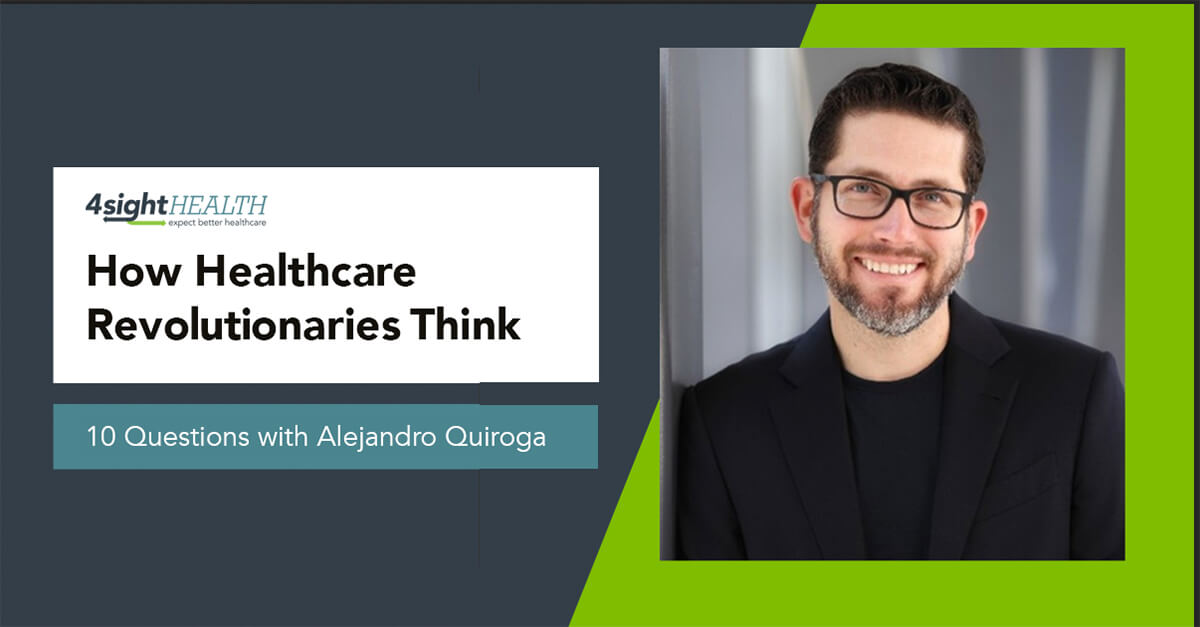December 5, 2023

How Healthcare Revolutionaries Think: 10 Questions with Alejandro Quiroga, M.D.
Welcome to the latest installment of 4sight Health’s series, How Healthcare Revolutionaries Think. Our interview series profiles healthcare instigators who believe that outcomes matter, customers count and value rules.
To say the transition from fee-for-service (FFS) medicine to value based care (VBC) hasn’t been smooth would be an understatement. In a recent report, even the American Medical Association acknowledged physician participation in alternative payment models is “stagnate.” But Alejandro Quiroga, M.D., may have found a way to stir the pot while others stand and watch.
Dr. Quiroga was named president of Corewell Health West, the Grand Rapids division of Corewell Health, born out of the 2022 merger between Spectrum Health and Beaumont Health.
As senior vice president of population health for Spectrum, he and his team embarked on a four-year journey to re-invent care management and primary care and position the system as a leader in value based care. The journey culminated in an EHR-directed system that segments patients based on their health insurance into FFS and VBC cohorts. Each cohort has different care management and primary care treatment protocols for physicians to follow.
FFS patients get the full-on FFS approach, which focuses on episodic interventions; VBC patients get the full-on VBC approach, which focuses on continuous prevention and wellness.
When the new patient segmentation system began four years ago, Spectrum had just $1 million at risk in VBC payment arrangements. Today, Spectrum (now Corewell) has more than $1 billion at risk in VBC payment arrangements. Dr. Quiroga and his team published the details of their journey in NEJM Catalyst Nov. 8 in an article called “Primary Care Redesign for Value Based Care.”
I spoke with Dr. Quiroga about his own journey and how that affected his thinking about healthcare and his approach to fixing healthcare delivery in the U.S. to make it work better for customers. You can also listen to a podcast interview with Dr. Quiroga on how being a nephrologist helps him think holistically about the interconnection between all pieces of the healthcare delivery system.
1. Dr. Quiroga, how would you define a healthcare revolutionary?
Quiroga: Call me Ale. I love the question. A healthcare revolutionary is a person trying to redefine how we deliver healthcare. It’s someone who thinks outside the box and heads in a different direction than everyone else. Too many of us are benchmarking ourselves against others. They want to be within the benchmarks. But the benchmarks are of things that aren’t working. A healthcare revolutionary wants to change the benchmarks. They want to change how we measure our performance.
2. So, the difference between non-revolutionary and revolutionary is how can we meet or beat the benchmark versus how we can be the best we can be?
Ale: Yes. We’re benchmarking against things that are not working, so, therefore, I question those things. We benchmark ourselves against our peers in the U.S. on things like mortality or spending per capita or staffing levels or how much we pay for this service or that drug. But we’re not benchmarking ourselves on those metrics from healthcare systems or providers in other countries whose performance on those same metrics are much better. True revolutionaries are going to ask why. They’re not going to swallow their numbers in the U.S. and be done with it.
3. Do you have a favorite healthcare revolutionary past or present?
Ale: Yes. Michael Porter. He’s not a healthcare guy. He’s an economist. But his 2006 book, “Redefining Health Care: Creating Value Based Competition on Results,” was one of the first voices to articulate the need for change in healthcare in an eloquent way, in an organized way. It gave us a template on how to think differently. He also published a paper in the Harvard Business Review with Thomas Lee, M.D., in 2013 called “The Strategy That Will Fix Healthcare.” That’s also essential reading for revolutionaries.
4. So, if you’re a healthcare revolutionary, you should have read both or at least have them on your nightstand or bookshelf.
Ale: If you say you’re a healthcare revolutionary, and you haven’t read or studied them, I’d question your status and revoke your healthcare revolutionary credentials. Not that I’m part of the committee. You’re the committee. And I would recommend that you revoke their credentials.
5. The press release that announced you as the new president of Corewell Health West described you as a catalyst for healthcare transformation. That’s like a healthcare revolutionary. Do you consider yourself a healthcare revolutionary?
Ale: I would love to join the ranks of healthcare revolutionaries. I don’t know where the group is, but you probably have their address. I want to go there. I think I’m an aspiring healthcare revolutionary. I definitely have a passion for changing all the things that need to change in the U.S. healthcare system. But so does everyone on my team. I have amazing team members who tolerate me and put up with me on a daily basis. Seriously, I have found myself in a privileged position to lead them and enable change for the community I serve.
6. Your team tolerates you? Are you a person who’s always asking them why, or why do we do it that way, or can we do it better? What are they tolerating about you as you try to change the system?
Ale: Creative tension is how we move the needle as a team in a mindful and meaningful way. I have little tolerance for the status quo or doing things the same way because that’s how we’ve always done them. We have to challenge every single assumption. I get so excited about new possibilities and new ways to care for our community. That drives that creative tension in our team. But they’ve embraced that way of doing things. The day everyone says they think my ideas are great, we have a problem. I’ve been lucky to find people to join our team who think the same way. They’re comfortable expressing new ideas and pushing back against other people’s ideas. It’s a dynamic process to be sure.
7. Not everyone thrives in that type of work environment. As you build your team, what are the traits you’re looking for in the people you hire?
Ale: Obviously, we look for people who are smart, hardworking and complement our team in terms of skill sets and competencies. Most of all, I look for people who are genuine. People who are themselves. People who are authentic. Whether you think outside the box or you don’t think outside the box, that’s not what I’m looking for. I just look for you to be genuine. To be able to articulate a point based on how you feel. Not how you think it would make me or others feel.
8. Tell me about your move to the United States. When did you emigrate to the U.S.? And why did you decide to stay in the U.S. to practice medicine?
Ale: I grew up in Columbia, and I come from a family with very few means. My mom and dad were never married. They never finished high school. They were young when they had me. I was not going down the right path myself. When I was 18, my ex-girlfriend told me she was pregnant. We had twins. It was the biggest wake-up call in my life. There were more of us, and our future was not looking good. We lived in a third-world country. We didn’t have much money. And there weren’t a lot of opportunities. I thought we would be homeless and live under a bridge.
I always wanted to go to medical school and be a doctor. So, I worked really hard to get into a good med school and got into one of the best in Columbia. I spent the last year of med school at Johns Hopkins as an exchange student. Hopkins was such an exciting world for me. That’s when I knew that moving from Columbia to the U.S. was the way I’d be able to provide a more stable life for my family and to give my children more opportunities than I had.
9. OK, now most other people in that same situation, at that pivotal point in their life, at that fork in the road, would say, “I better get a job,” or, “I’m out of here.” But you said, “I know. I’ll be a doctor! That’s the ticket!!” Not many people would say that. In fact, you may be the only person who’s ever said that. Why medicine?
Ale: No one in my family is a doctor or in a healthcare profession. Everyone is in creative fields. Artists, writers, musicians. I’m the black sheep of the family. I loved biology growing up. All the natural sciences. As a teenager I was a volunteer for the Red Cross, and I just loved it. And I fell in love with medicine.
When that wake-up call came, I realized that I had to be a good role model and try to find a stable path. Getting a job in any field wouldn’t have worked. I had to do something that I was passionate about to be able to deliver on what I wanted for myself and for my family. It’s an easy story to tell right now. It was a hard story to tell back then. When I told people that’s what I wanted to do, they’d look at me and say, sarcastically, “Of course! Yeah, right.”
10. From being almost homeless to being a doctor. From M.D. to M.B.A. From nephrologist to administrator. From fee-for-service medicine to value based care. What would the old you tell the young you if you could go back in time? What would the young you think of you now?
Ale: If I went back in time and told the 10-year-old me that I own a car, he’d be like, “What? No way!” I’d tell him I’m married. I own a house. I can eat whatever I want. He’d be surprised. No way he would think that this was his future. I’d also tell the young me to believe more in himself, to be kinder and to exercise more. Most of all, I would tell him that it’s possible.
Burda’s Final Bit
It’s possible. Not only does that describe Dr. Quiroga’s life journey, but it also describes the transition from FFS to VBC. It’s possible. You just have to do it. Maybe it will take someone like Dr. Quiroga to just do it in your organization as most incumbent healthcare industry leaders live comfortably personally and professionally off the current system and all its dysfunction. They don’t have the same passion for fixing the system for their customers. Maybe they should live under a bridge for a while, develop or exacerbate a pre-existing chronic illness and then try to access the healthcare system. Maybe we should make that part of the medical school and MHA program curriculum? Then they will see how fast things change.
Alejandro Quiroga, M.D. is an innovative and transformative senior physician-operational and population health executive who focuses on building inclusive and best-in-class patient-centered care teams and models. He excels as a creative problem solver with a proven history of transforming complex systems to improve efficacy and simplicity with unique approaches that fuse clinical, business, academic and hospital management experience to advance systems and deliver industry-leading results in patient outcomes.
Corewell Health is here to help people be well so they can live their healthiest life possible. Through health care and health coverage, they create more value, and through compassion, collaboration, clarity, curiosity and courage, they strive to make anything and everything possible.
Read more Healthcare Revolutionary interviews.
- Healthcare Revolutionary Samir Goel
- Healthcare Revolutionary Marcus Whitney
- Healthcare Revolutionary Demi Radeva
- Healthcare Revolutionary Michael Pitt, M.D.
- Healthcare Revolutionary Rebeckah Orton
- Healthcare Revolutionary Dan Trigub
- Healthcare Revolutionary Melina Davis
- Healthcare Revolutionary Bruce Brandes
- Healthcare Revolutionary Lena Chaihorsky
- Read them all here.





